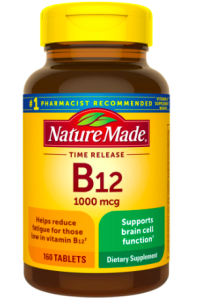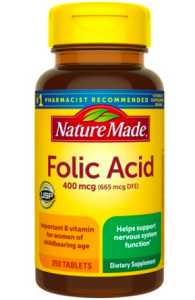91 Vitamin B9 and B12 Deficiency in Dogs – Why Do We Care?
velez093; gonz0833; and bastu006
Learning Objectives:
- Define cobalamin and folate and describe their role in the digestive process.
- Describe what conditions can lead to deficiencies in the levels of Vitamin B9 and B12.
- Understand how blood tests can identify deficiencies in the levels of Vitamin B9 and B12.
- Describe the basic diseases that result from Vitamin B9 and B12 deficiency.
What is cobalamin?
What is folate?
What can cause Vitamin B9 and B12 deficiency?
Deficiency is when there is not enough of something, so in the case of a vitamin deficiency, the body doesn’t have enough vitamins to be healthy. Deficiency can be because there is not enough of the vitamin in the food to begin with, or can be because the dog’s GI tract is damaged and is not absorbing enough of the vitamin, even if there is enough of it in the food.
What happens when there is a Vitamin B9 or B12 deficiency?
When there is a vitamin deficiency, the dog can get sick. There are many different symptoms and they depend on how bad the deficiency is. Some symptoms include low energy, diarrhea, weight loss, and neurological issues. Remember that Vitamin B9 and B12 are critical for nerves, blood cells, and cell growth, so when these things don’t work properly, the whole body can suffer the consequences!
How can we test the levels of cobalamin and folate?
Testing levels of B12 and B9 are done through running blood work. Your dog’s veterinarian will get a sample of blood from your dog and send it off to a lab that will check the levels of B12 and B9. Normal levels of Vitamin B12 in dogs range from 300 to 1,000 ng/L (nanograms per liter) and normal levels of Vitamin B9 range from 7 to 18 µg/L (micrograms per liter). Your dog can have low Vitamin B12 or low Vitamin B9, or both! Your dog’s veterinarian will then determine if the levels are normal or low, which we will also practice today. As a side note, Vitamin B12 levels can be high, which indicates other issues that are not a deficiency, but that will not be covered in this lesson.
How can we treat abnormalities in cobalamin and folate?
Vitamin B12 deficiencies are more common, while Vitamin B9 deficiencies are pretty rare, but the good news is that both are easily treatable! If your dog’s veterinarian determines that one or both of these vitamins are too low, they will prescribe your dog that vitamin in a pill form. You may be familiar with these as they are commonly seen at the human pharmacy and maybe your parents take them. Vitamin B12 is also available as a shot, but most people choose the pill form. This treatment is very effective and will help your dog return back to normal.


Activities
Based on what we’ve learned today, indicate if each vitamin level is low or normal, using the normal ranges listed above.
Knowledge Check

Sam during his vet appointment

